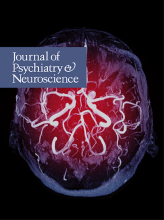We read with interest the case report by Korchia and colleagues in which pharmacogenomic testing was used to investigate a young man’s adverse effects to 3 different antipsychotics.1 The test results (CYP2D6 poor metabolizer) provide a plausible explanation for the adverse effects he experienced with aripiprazole, risperidone and haloperidol, which are all metabolized, at least in part, to a mix of active and inactive metabolites via CYP2D6. For each drug, CYP2D6 poor metabolizers on average have higher exposures to total active drug moieties (e.g., risperidone + 9-hydroxyrisperidone [paliperidone]) compared with CYP2D6 normal metabolizers.2–4 Pharmacogenomics then guided the subsequent prescribing of paliperidone, a predominantly renally cleared antipsychotic with no active metabolites, which is less dependent on CYP2D6 for metabolic clearance.5 Pleasingly, this drug was well tolerated and effective in treating the patient’s first-episode psychosis.1
Despite pharmacogenomics helping the case, we were confused when “treatment failure” was used in the explanation to describe the outcomes of treatment with aripiprazole, risperidone and haloperidol in patients who were CYP2D6 poor metabolizers. We assume the authors used this phrase to mean cessation of drug because of significant adverse effects. However, when applying pharmacogenomics for the major drug metabolizing enzymes and transporters involved in pharmacokinetics, the terminology “treatment failure” indicates poor efficacy due to low exposure (i.e., low concentration) following an adequate therapeutic trial.6,7 Indeed, the Clinical Pharmacogenomic Implementation Consortium and the Dutch Pharmacogenetics Working Group guidelines use “treatment failure,” “pharmacotherapy failure,” “diminished response” or “therapy failure” interchangeably in this context.8–11 Not helping in the matter is the retrospective cohort study used to support this language (reference 6 in the case report).12 The original study simplistically defined treatment failure as the number of patients who switched from risperidone or aripiprazole to another antipsychotic within 1 year. The explicit reasons for switching were not provided. On closer inspection, the incidences of switching from risperidone were higher in CYP2D6 ultra-rapid metabolizers (odds ratio [OR] 2.934), which results in lower exposures to total active drug moieties (risperidone + 9-hydroxyrisperidone), and CYP2D6 poor metabolizers (OR 1.874), which results in higher exposures to total active drug moieties, compared with CYP2D6 normal metabolizers, suggesting that both poor efficacy and adverse effects contributed to the treatment failure end point.12
The authors do explain that “risperidone is likely to be too slowly converted to its active metabolite, leading to a greater risk of adverse effects.”1 This too is confusing for the nonexpert, since it implies that risperidone is inactive until metabolized to 9-hydroxyrisperidone via CYP2D6 (akin to the metabolic activation of codeine to morphine). Why then should less activation cause more adverse effects? The authors presumably mean that CYP2D6 poor metabolizers have increased exposure to total active drug moieties and a shift in the risperidone to 9-hydroxyrisperidone ratio. The resulting higher plasma concentrations of risperidone, which penetrates the central nervous system more readily than 9-hydroxyrisperidone, greatly increases the risk of adverse effects.12
The case report by Korchia and colleagues1 nicely demonstrates the clinical value of pharmacogenomic testing when diagnosing medication-related problems. Importantly, it also highlights the problem of inconsistent terminology and taxonomy across the disciplines involved in pharmacogenomic testing and clinical implementation. We contend that “unexpected poor efficacy” and “intolerable adverse effects” are strong descriptive phrases for medication-related problems, which often result from excessively low or high drug exposures, respectively. Therefore, the consistent application of these descriptions (and aligned pharmacology) to pharmacogenomic cases will reduce confusion over terminology and make pharmacogenomics less confronting and more accessible to nonexperts.
Footnotes
Competing interests: Thomas Polasek provides a pharmacogenomics consulting service for Sonic Healthcare Ltd., and Sam Mostafa is employed by myDNA Life, a company offering pharmacogenomic testing and advice. No other competing interests were declared.
This is an Open Access article distributed in accordance with the terms of the Creative Commons Attribution (CC BY-NC-ND 4.0) licence, which permits use, distribution and reproduction in any medium, provided that the original publication is properly cited, the use is noncommercial (i.e., research or educational use), and no modifications or adaptations are made. See: https://creativecommons.org/licenses/by-nc-nd/4.0/






